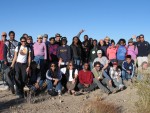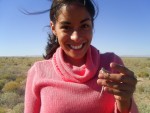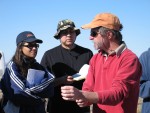The Ecological Society of America's (ESA) Strategies for Ecology Education, Development and Sustainability (SEEDS) Program provides a variety of opportunities-campus chapters, research fellowships, meeting travel awards, and field trips-to stimulate and nurture the interest of minority undergraduates in ecology. Established in 1996, over the last decade the program has made great strides in increasing the representation of minorities in ecology. Since 2003, the LTER network has had a growing role in this success.
The SEEDS field trips, which offer exciting opportunities for undergraduate students to explore their interest in ecology, have given rise to a developing partnership between ESA and the LTER network. LTER sites are ideal locations for the field trips as they provide undergraduate students the chance to explore a broad range of research areas and to interact with a large network of researchers in one place. Common features of each field trip include face-to-face interactions with experienced ecologists and a diverse group of graduate students; participation in hands-on field research; a panel for professionals to share their career pathways and advice with the students; and strong peer mentoring and support as students from all over the nation meet to share and develop their interests in ecology.
When the field trips occur at LTER sites, the LTER community has, in turn, the opportunity to meet a group of promising and diverse students in the beginning stages of their ecology careers. LTER ecologists participate in the field trips in a number of ways, ranging from hosting the group and helping prepare the agenda, to presenting their own research and serving on a career panel.
The first collaborative ESA SEEDS/LTER field trip was led by Dr. Alan Berkowitz at the Baltimore Ecosystem Study in November 2003. The trip followed the Gwynns Falls watershed from a relatively low density area to an urban Baltimore neighborhood. Along the way students discussed topics like soil ecology, forestry, hydrology, and water monitoring and interacted with many researchers and community members. The trip was a powerful eye-opener for many students who learned about the existence of urban ecology for the first time. One student observed, “It was so amazing to be surrounded by a diverse group of awesome scientists. The field trip introduced me to ideas that I had never heard before. It was so cool to see the many directions one can take in an ecology degree, even into the city.”
The second SEEDS/LTER field trip took place in November 2005 at the Sevilleta LTER in New Mexico. Led by Dr. Scott Collins, this group of students toured several different research sites within the Sevilleta LTER and saw the diversity within this unique desert ecosystem where several biomes converge—the Chihuahuan Desert to the south, Great Plains grassland to the north, subalpine forests in the higher elevations, and the riparian area created by the Rio Grande valley that runs through the site. Many students on this field trip came from moist, humid climates and had never seen a desert ecosystem. The subtle changes in biomes and the diversity of microbes that dwell underground helped the students understand that there is more than meets the eye in the realm of ecological diversity. In addition, students gained an appreciation of the scale of long term research, and the number of people involved in generating ecological knowledge.
The next two SEEDS/LTER field trips are planned for June 2006 at the Konza Prairie LTER site in Kansas and November 2006 at the Coweeta LTER site in the Appalachian Mountains of North Carolina. The evolving partnership between the ESA/SEEDS program and the LTER network is natural given the shared objectives of both programs to advance the science of ecology in the broader student community. We hope that this collaboration will continue to grow as both have much to offer one another.
For more information about the SEEDS field trips please visit www.esa.org/seeds or email seeds@esa.org.

 Enlarge this image
Enlarge this image

